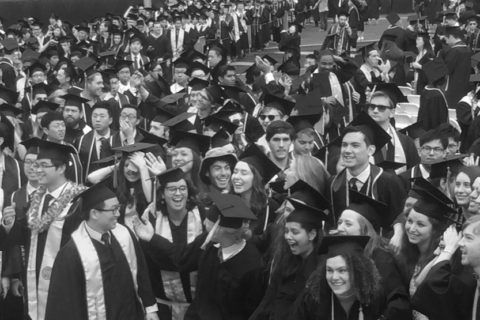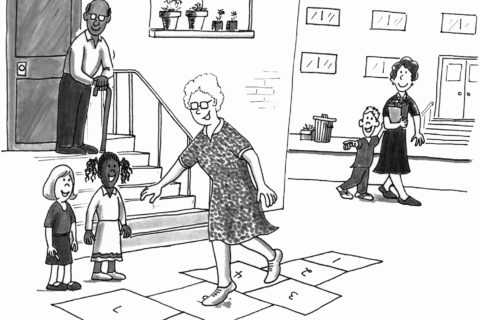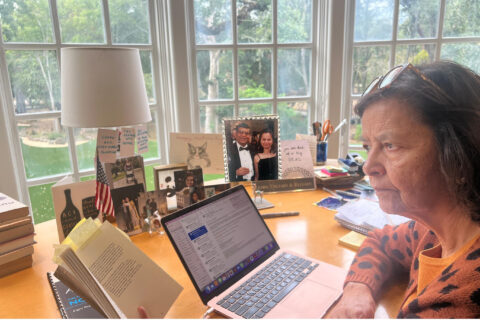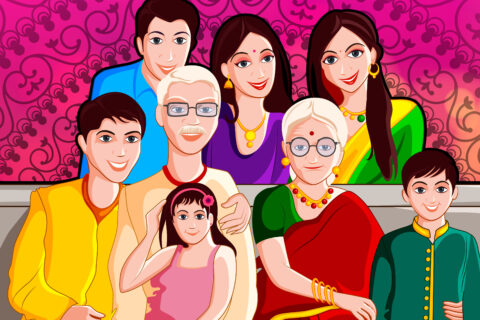
Assimilation issue started weaving in my head, after a recent conversation with Ro Khanna, an Indian American Congressman from Silicon Valley. I applaud Ro both for trying to bridge the gap between Silicon Valley and Iowa, and for attempting to improve our relationship with an overture of integration. He shared that Americans in Iowa are concerned about immigrants taking away “their” jobs. In addition, with the influx of immigrants — clinging to their own ethnic groups — Americans fear dilution of “their” own culture.
Assimilation to me means blending with Americans in everyday life. It entails feeling comfortable asking American friends for rides to the airport, or dropping the kids off when babysitter does not show up, or taking extended vacations together.
I started thinking that if we Indians were better integrated into America, Iowans might sense that we also admire their culture and have no interest in undermining it.
Ro, like my daughters, is a second-generation Indian. He went to school with Americans, he understands them and speaks the lingo.
It has not been so easy, even for a highly educated first-generation Silicon Valley Indian immigrant, to assimilate.
Recently, I asked a former Roche American executive, who had just moved back to the US after 10 years in Switzerland, his opinion of the Swiss people. He said, “they follow the rules.” I replied, “it takes decades to understand and feel comfortable in a foreign country.” He understood what I meant, and asked if I feel comfortable in the US, now. “Eighty percent, “ I answered.
In Silicon Valley, where I have lived for 45 years, Indians tend mostly to socialize with their fellow Indians. It is not uncommon even for Americans, “(who) in Vienna stick with their familiar expatriate groups, hardly mingling with Austrians,” – per our Austrian hosts.
Assimilation is hard and takes decades of sustained effort.
To second-generation Indians, including Indo-Canadian comedian Russell Peters, who lovingly roasts his parents’ Indian friends, whom he was asked to address “Uncle Ji” and Aunty Ji (Ji added for respect), these cultural nuances create social barriers that hinder the cozy interactions that pave the way to friendships and deeper ties.
Professionally, Indians in America have done quite well. Their median household income is $100K compared to $63K for all Americans. First-generation Indians are now at the helm of Adobe, Google, MasterCard, and Microsoft.
Silicon Valley Indian immigrants have adapted more easily to work culture, partly because we are thrown into it straight out of college when we are young. Also, the business environment is more egalitarian as people are measured on their performance.
Indians of Silicon Valley are highly skilled in technology and finance. Further, the scrappiness of Indian immigrants also helps them navigate as entrepreneurs where the money is tight and resourcefulness is an asset. Some of us found entrepreneurship an easier path than rising through corporate America — lacking familiarity with many high level American business etiquettes.
However social interactions are much more complex. Besides language and education, we are shaped by the songs, the gods, the food and the jokes, and the tales that get stuck in our heads, in childhood. We would try to figure out:
- While asking questions, when not to be nosy
- While leaning on a friend, when not to be too demanding
- How much superlatives usage is acceptable
Once my husband’s close business associate said to him, “If you do not agree, why don’t you say so?” In a formal setting, Indians keep quiet because expressing disagreement is considered rude.
My husband and I were befriended by numerous Americans. One of my executives, Curtis, had to tell me tactfully that I smelt of perspiration. In India, we did not use deodorant despite the heat. Dick and Helen invited my family to their Easter celebration every year, and Marty and Mary took us sailing. Through them, we started getting a real glimpse of how Americans think and interact.
Our Silicon Valley Indian friends are our support system. When my husband was hospitalized for a month at Stanford, his doctors were amazed at how our Indians friends and family poured in every evening and weekends with food and flowers. Mahendra, an Indian pathologist, from another hospital heard of it from his son’s friend and showed up at Stanford. His expertise came handy in his recovery. My husband’s brother, a vice president at American Express in New York, took an extended leave and stayed with us, along with his family, till he recovered!
My continued interactions with American friends and also with our own daughters who were born and raised here, are making me feel more at home. Yet, I can sense when Americans become uneasy in conversations. Each such encounter is a reminder that assimilation is a journey.
As a big fan of Trevor Noah, the South African born comedian, I am envious at how quickly upon his arrival from Africa, and with what confidence he can amuse hoards of Americans, Indians, Blacks, Asians, Hispanics and the British, through his comedy. It proves that at our core, humans are touched by the same things.








Deepka Lalwani
You just spoke my thoughts…
Re perspiration, a friend was told by her boss. In India we predominantly wore cotton and there was a lot of natural air circulation. Here in closed offices and synthetic material, BO problem is much more.
I’ve heard many cases where sweaty person felt very insulted by remark.
Piyali Ganguly
very well written Vinita. i am enjoying your writing. love, pia
Asha
Totally enjoyed reading it.You eloquently wrote for many of us – a difficult topic. Thank you for addressing it.
Sunil Suri
Dear Vinita:
Greetings & Good Evening,
Allow me to comment please:
To wit,
There is a rather different element to this talk of assimilation. I think you should also reflect upon it. As a view to add to your view.
I go the other way Vinita. I have many friends all across the planet too. But one thing most say to me – I think them meaning truthfully – that my individuality is what interests them most. In that I am not exactly a replica of the other to many things is why they befriend me.
Homogeneity has its negatives.
In that I bring a different view point I add not detract. I attract.
I am at ease with most – at least those who are paragons of wisdom and carry a panache.
In that I value different things relative to those whom I encounter, engage, debate, nurse and or transact with to commerce – and I being an enigma – to a degree is a positive. I am at times thought of as Spanish, Moroccan, Brazilian, Indian, Middle Eastern – and lo and behold – at times taken for possibly Italian – because I dress like one, I drive Ferrari’s & Lamborghini’s and then vacation on the Amalfi coast;
If I was easy to read and easy to predict I would be like the hamburger at McDonalds. Same taste all over the planet. This is not interesting.
Be different I urge. Do not assimilate I advocate.
Our society is richer for our novelty. And individuality. Being different allows others to pick and choose and then like or dislike or bah humbug!
And I as one who lives to eat – and not eat to live – I like coveting those who remain the original act. From wherever. In this case being in California – a melting pot – is sublime.
Thank you as always for an engaging write – Kudos and keep the pen dotting the paper or in this case the media –
Good Day
Bala Balakrishnan
Interesting to read. Do you have kids? Are they married to Americans, Indo or otherwise? If they did you are assimilated
gd_support
One is married to an American, and his family helps us in the assimilation process, yet…
chitra divakaruni
Very well put, Vinita. I agree with you. It is a complex situation
Sunil Kumar Goel
I think a little more elaboration is required.
Sar Gohel
Iowa is where I used to live. Pocahontas with a population of 2000 and not too many immigrants. When I got my citizenship in 1976 the immigration officer will come from Omaha for the interview. Only other Indian family was 30 miles away. My 3 children were small, Sejal was in kindergarten. Neighbors were very helpful and will take care of children when my wife has other things to do. You are forced to integrate, no other choice. Here in Detroit so many Indians so you go back to your own culture. All children married white Americans. Still you don’t feel comfortable with their in-laws. Grandchildren try to learn both cultures.
gd_support
It is a journey. But we are also lucky that we have exposure to two cultures, which elevates our thinking.
Diana L Bell
Hello Vinita,
Though I haven’t commented, I often read your blog. I commend you for sticking your toe in the water on this subject which raises the question of what it means to be American. I have traveled to all 7 continents, over 50 countries, and am always happy to come home. Yet, what has made America home for those of us who are African American has been our willingness to undermine those aspects of the culture that are oppressive. And, that’s a gentle way of stating this fact. This is not “their” America, it is our America.
I am not a social media type. I paused for a long time before responding. But, Langston Hughes’ poem, I Too, came to mind. It starts “I, too, sing America. I am the darker brother, they send me to eat in the kitchen when company comes. But, I laugh, and eat well, and grow strong.”
This is probably a better conversation over a glass of wine. Hoping that you are well. We miss you on the Bay Area board.
Diana
P.S. I love Trevor Noah as well! Have you read his book, Born a Crime?
gd_support
The poem brings tears, not for myself but for many. Thanks Diana.
Jini Gupta
Lovely Article Nita Didi!!!
Really enjoyed reading it.
??Jini
Karen Druker
Wonderful! Personally I welcome all cultures into our wonderful “Melting Pot ” that is America and always has been America.I take to heart ” Give me your tired , your poor, your wretched refuse yearning to be free……..
Diversity can only enrich our country. It’s like our diets: who doesn’t love variety? I love Burmese food, Mexican, Thai, Indian, German, and last night Opa’s Greek! . Meat and potatoes would be boring. Only American Indians are native here. How did people get so snooty?